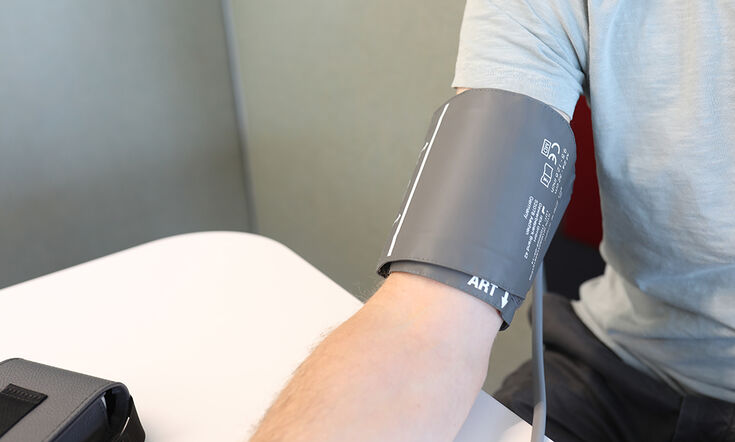With over 20 million people affected, i.e. around one in three adults in Germany, high blood pressure is one of the most widespread diseases of our time - and a high health risk. According to studies, 40 per cent of all deaths in Europe are due to a disease caused by high blood pressure. The Hochschule Niederrhein (HSNR) is involved in a study being carried out at the Nephrology Department of the University Hospital in Düsseldorf, which is looking at individualised training therapy for hypertension patients.
Permanently high blood pressure leads to an increase in vascular damage, which manifests itself, among other things, in a stiffening of the vascular system and ultimately leads to atherosclerosis (pathological storage of cholesterol and other fats in arterial blood vessels), rupture or vascular atrophy (shrinkage of the vessels). It is also known that sports and exercise therapy can contribute to lowering blood pressure - especially endurance and dynamic strength training. "However, it is still unclear how exactly exercise works at the vascular level," says Dr Lukas Streese, academic staff member in the HSNR's Therapy Sciences department. "The study will therefore carry out extensive non-invasive measurements of the vascular system in order to investigate the effects of blood pressure reduction, in combination with individualised sports therapy, on arterial blood pressure, vascular structure and vascular function. The results of this study should advance the personalisation of blood pressure therapy."
The study investigates the effect of individualised exercise therapy, as an additional therapy to guideline-based therapy to lower blood pressure, on vascular function and blood pressure reduction in patients with a first diagnosis of high blood pressure. The primary aim of the study is to determine whether blood pressure therapy with or without additional exercise therapy leads to improved regeneration of vascular function and whether these potential adaptations are dependent or independent of the reduction in blood pressure, says Lukas Streese. "In other words: Is it useful for blood pressure patients to complete an individually tailored exercise programme in addition to appropriate medication?"
A total of 60 people with a first diagnosis of high blood pressure will be part of the study, which is being conducted at the University Hospital in Düsseldorf. One group will receive a standardised therapy to lower arterial blood pressure. The other group will also receive individualised sports therapy, which will be carried out partly under supervision and partly independently. During the first six months, blood pressure and vascular health are examined every two months and the blood pressure therapy is adjusted if necessary. A further six months later, the study participants are invited back to check whether the target blood pressure has been maintained in the long term.



















